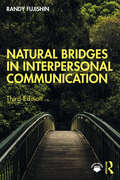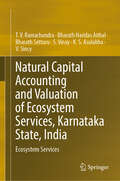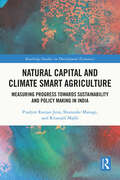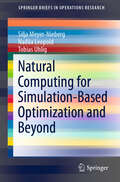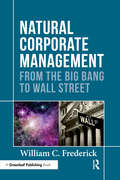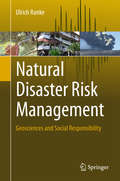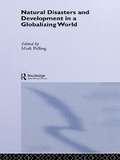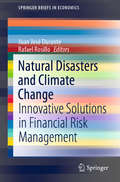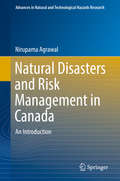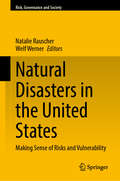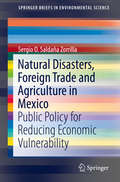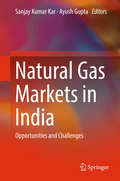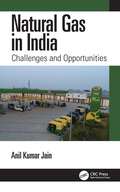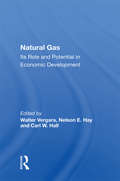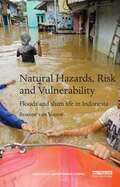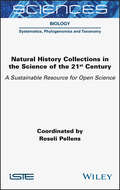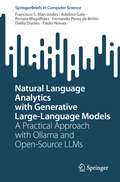- Table View
- List View
Natural Blends, Inc.
by H. Kent Bowen Ramchandran Jaikumar Karen KrauseDescribes the continuous flow process used to generate orange juice concentrate. Production involves several tightly coupled process steps with varying production rates and setup times. Given production constraints and customer requirements, management choices must be made to maximize the greatest contribution.
Natural Bridges in Interpersonal Communication
by Randy FujishinWith a particularly student-friendly and engaging style, this third edition gives readers the fundamental tools necessary to effectively communicate in interpersonal interactions. Natural Bridges in Interpersonal Communication, Third Edition, is a concise and practical book that introduces students to the basic concepts and skills of interpersonal communication in both face-to-face and online interactions in personal and professional settings. Each chapter features human interest stories and review exercises to help students better understand the concepts covered. This edition continues its expanded coverage of foundational research and devotes additional space to discussions of cultural safety, race and ethnicity, issues of mental health, and technology and social media. This textbook is designed for communication studies, business, and career and trade courses in interpersonal communication and communication skills at the community college and four-year university levels. Online instructor materials that accompany the book include an instructor’s manual, sample exams, and a sample class schedule. They are available at www.routledge.com/9781032355054.
Natural Capital
by Dieter HelmNatural capital is what nature provides to us for free. Renewables like species keep on coming, provided we do not drive them towards extinction. Non-renewables like oil and gas can only be used once. Together, they are the foundation that ensures our survival and well-being, and the basis of all economic activity. In the face of the global, local, and national destruction of biodiversity and ecosystems, economist Dieter Helm here offers a crucial set of strategies for establishing natural capital policy that is balanced, economically sustainable, and politically viable. Helm shows why the commonly held view that environmental protection poses obstacles to economic progress is false, and he explains why the environment must be at the very core of economic planning. He presents the first real attempt to calibrate, measure, and value natural capital from an economic perspective and goes on to outline a stable new framework for sustainable growth. Bristling with ideas of immediate global relevance, Helm s book shifts the parameters of current environmental debate. As inspiring as his trailblazing "The Carbon Crunch," this volume will be essential reading for anyone concerned with reversing the headlong destruction of our environment. "
Natural Capital Accounting and Valuation of Ecosystem Services, Karnataka State, India: Ecosystem Services
by T.V. Ramachandra Bharath Haridas Aithal Bharath Setturu S. Vinay K.S. Asulabha V. SincyThis book describes the valuation of services of ecosystems (forests, agriculture and aquatic) for Karnataka State, India, as per the validated statistical framework for natural capital accounting – SEEA: System of Environmental-Economic Accounting (SEEA.un.org). According to SEEA protocol, ecosystem services are defined as the contributions of ecosystems to the benefits that are used in economic and other human activities. The valuation of ecosystem services (VES) provides an unbiased framework to value unaccounted ecosystem benefits and helps in developing meaningful policy interventions. The approach allows for adjusted regional or national accounts which reflect the output of ecosystem services as well as the depletion of natural resources and the degradation costs (externalized costs of the loss of ecosystem services) of ecosystems in economic terms. In this perspective, the current publication, focusing on the natural capital accounting and valuation of ecosystem services in Karnataka, India, can help raise awareness and provide a quantitative tool to evaluate the sustainability of policies. The book would aid as knowledge base for many professionals, institutions and government agencies taking up the task of natural capital accounting and valuation of ecosystem services across the countries worldwide.
Natural Capital and Climate Smart Agriculture: Measuring Progress towards Sustainability and Policy Making in India (Routledge Studies in Development Economics)
by Shunsuke Managi Pradyot Ranjan Jena Ritanjali MajhiIndia is the fastest growing and the world’s third-largest economy in terms of GDP in PPP terms. Sustainable development of India will ensure the welfare of the inhabitants of this most populated country. This book assesses trends of natural capital and areas of improvement through climate resilient agricultural adaptation in India.The book looks at how the agricultural sector can become more climate resilient to ensure food security and human capital development. It also suggests a policy framework towards climate-resilient agricultural development. It outlines determinants of climate-smart agricultural practices and their impact on agricultural yield, biodiversity, and food security, and as well as outreach activities for wider collaboration from around the world.This book will interest those who are researching accounting natural capital impacts of climate-resilient agriculture and 2030 SDGs.
Natural Capitalism: Creating the Next Industrial Revolution
by Paul Hawken Amory Lovins L. Hunter LovinsIn this groundbreaking paradigm for the economy, three leading business visionaries explain how the world is on the verge of a new industrial revolution, one that promises to transform our fundamental notions about commerce and its role in shaping our future.
Natural Computing for Simulation-Based Optimization and Beyond (SpringerBriefs in Operations Research)
by Silja Meyer-Nieberg Nadiia Leopold Tobias UhligThis SpringerBrief bridges the gap between the areas of simulation studies on the one hand, and optimization with natural computing on the other. Since natural computing methods have been applied with great success in several application areas, a review concerning potential benefits and pitfalls for simulation studies is merited. The brief presents such an overview and combines it with an introduction to natural computing and selected major approaches, as well as with a concise treatment of general simulation-based optimization. As such, it is the first review which covers both the methodological background and recent application cases. The brief is intended to serve two purposes: First, it can be used to gain more information concerning natural computing, its major dialects, and their usage for simulation studies. It also covers the areas of multi-objective optimization and neuroevolution. While the latter is only seldom mentioned in connection with simulation studies, it is a powerful potential technique. Second, the reader is provided with an overview of several areas of simulation-based optimization which range from logistic problems to engineering tasks. Additionally, the brief focuses on the usage of surrogate and meta-models. The brief presents recent application examples.
Natural Corporate Management: From the Big Bang to Wall Street
by William C. FrederickThis groundbreaking new book by business scholar William C. Frederick presents an innovative, exciting – even revolutionary – view of corporate management and the challenges it confronts in today's world. The author proposes a management paradigm shift transforming the way corporations do business. Management scholarship and research may well be rechanneled from current orientations to new models, concepts, and theories of what it takes to manage corporations in a planetary world confronting climate change, energy crises, and securing the well-being of all global citizens. Natural Corporate Management (NCM) is an awareness and an acceptance by the managers of today's business corporations of the close functional linkage between natural forces and human economic choices. NCM is not a set of techniques or methods but is a growing consciousness by managers of the presence and influence of nature in all managerial decisions. The book's central theme is that business and nature are locked into an evolutionary partnership that defines all aspects of corporate management, including decisions, policy, goal-seeking, organizational design, workplace behavior, and productive operations. This partnership of Nature and Nurture yields economic, social, and ecological dividends for corporations, their stakeholders, and the global community. An "Evolutionary Cascade" depicts the various phases of evolutionary change – physical, organic, genetic, human, neurological, symbolic – beginning with the Big Bang origin of the Universe and continuing to modern times. These evolutionary events collectively influence the operational activities of all business firms. A "Natural Theory of the Firm" summarizes the NCM approach, as well as the mind-set of corporate managers, and the bio-socio-economic consequences of their decisions. This theoretically-innovative book proposes an agenda of corporate actions to promote long-term sustainability and economic well-being of business, its stakeholders, and planetary citizens everywhere. It will be essential reading for managers and researchers at all levels who wish to engage seriously with the challenges of organic life and its long-term sustainability.
Natural Disaster Risk Management
by Ulrich RankeThis textbook provides a thorough introduction to natural disaster risk management. Many aspects of disaster risk management, such as those involved in earthquakes, volcanic eruptions, floods, avalanches and mudslides call for similar prevention and preparedness instruments, management concepts, and countermeasures. This textbook assumes the viewpoint of a regional disaster risk manager who is responsible for a certain area, and for making the lives of the people who live there safer, regardless of the type of natural disaster that may occur. The same holds true for boosting preparedness and awareness in the population at risk. The book includes numerous examples of hazard mitigation concepts and techniques, as well as ways of intensively involving the local population in prevention schemes at an early stage. Furthermore, it provides an in-depth examination of the function of risk communication, both as an instrument for disseminating official information and as a function of public media. In closing, a chapter on risk splitting offers insights into insurance-based models for risk financing. This comprehensive book is a must-read for all students, researchers and practitioners dealing with natural disaster risk management.
Natural Disaster and Development in a Globalizing World
by Mark PellingThe number of humanitarian disasters triggered by a natural hazard has doubled every decade since the 1960s. At the same time, the global economic growth rate per capita is twice its 1960s value. Does this mean economic growth is independent of the impacts of natural disaster? Natural Disaster and Development in a Globalizing World is the first book to acknowledge the full implications of globalization for disaster and development. The contributors to this book fully examine: global processes and how they might affect disaster risk at the global scale. links between international issues - such as diplomatic relations, the growth of non-governmental organizations and the health of the international insurance industry - and disaster risk the interaction of these large scale forces with local conditions through case study analysis of individual disaster events. In his revealing work, author Pelling makes clear the links between global scale processes and local experiences of disaster, and underlies the difficulty of attributing blame for individual disasters on specific global pressures. He argues that action to reduce disaster must be coordinated at the local, national and global scales and that there is a need for greater integration across the physical and social sciences. In this context, the human rights agenda is seen as a way of moving disaster reduction efforts forward.
Natural Disasters and Climate Change: Innovative Solutions in Financial Risk Management (SpringerBriefs in Economics)
by Juan José Durante Rafael RosilloThis book presents a technical approach to promoting the development of disaster and climate change risk financing and transfer strategies, and discusses several practical issues, chiefly focusing on Latin America and the Caribbean. Innovative risk financing and insurance mechanisms are vital for governments around the world, in order to provide financial protection and reduce the economic costs and social and developmental impacts of natural disasters and climate change. The book’s main content is complemented by a wealth of graphics, diagrams and tables that illustrate the concepts discussed and make the text accessible for practitioners and non-practitioners alike. The book offers proven, creative and innovative ideas on how to tackle risk financing and management for natural disasters and climate change. Strategic topics such as sovereign disaster risk financing, property catastrophe risk insurance, and agricultural insurance are also discussed.
Natural Disasters and Risk Management in Canada: An Introduction (Advances In Natural And Technological Hazards Research #49)
by Nirupama AgrawalThese chapters provide valuable and comprehensive information on a variety of hazards, including both scientific and social aspects of disasters. The work introduces the concept of large, medium and small scale hazards, and includes many useful case studies as well as working examples of theoretical concepts.As readers will acknowledge, today the distinction between natural and technological hazards is becoming blurred and a new concept of NATECH hazards is evolving. For permanent hazards (such as tides, wind waves, coastal erosion and climate change) routine predictions are made, whereas for evanescent hazards (including droughts, sea level rise, and coastal subsidence), monitoring of various parameters is the norm. Only for episodic hazards (for example hurricanes, winter storms, tsunamis, and river floods), early warning systems are used, with varying degrees of success.The book explores how, for certain episodic hazards like tornadoes, landslides, forest fires, snow avalanches, and volcanic eruptions, the early warning systems are still in various stages of development. Readers will gain knowledge of theoretical and practical concepts of risk evaluation which assist in better understanding of disaster dynamics, and readers will become better equipped in quantification of disaster risk and vulnerability. The author explains how risk reduction initiatives, taking into account stakeholders’ participation and perception, can provide a roadmap to building resilient communities and cities.This book will be useful not only to practitioners of disaster management but also to research scholars and graduate students. It is highly readable and will appeal more broadly too, to all those who are interested in the very latest thinking on, and expert analysis of, hazards and disasters.
Natural Disasters in the United States: Making Sense of Risks and Vulnerability (Risk, Governance and Society #22)
by Welf Werner Natalie RauscherThis volume examines the history of natural disasters in the United States and the nation's ongoing struggles with long-term disaster preparedness and response. It explores the political, economic, and cultural factors that have shaped the country's vulnerability. It highlights why, despite its vast resources, the United States has remained one of the most resistant actors in recognizing and mitigating disaster risk. Bringing together contributions from a variety of fields, this book analyzes the role of political institutions, media narratives, and cultural perceptions in shaping disaster policy. It examines key historical events to identify patterns of governance failure and missed opportunities to build resilience. Ultimately, this volume provides crucial insights into the historical baggage that the United States brings to multilateral climate negotiations, helping to explain its often frustrating role on the international stage. This book is essential reading for students, researchers, and scholars in the social sciences, humanities, and environmental studies, as well as policymakers and practitioners seeking a deeper understanding of the challenges and shortcomings of U.S. disaster mitigation policy. Chapter &“&‘Becoming Green:&’ Resilient and Green Building as Risk Mitigation in Atlanta, Georgia&” is available open access under a Creative Commons Attribution 4.0 International License via link.springer.com.
Natural Disasters, Foreign Trade and Agriculture in Mexico
by Sergio O. Saldaña ZorrillaThis work responds to the increasing global need of measuring and analyzing impacts, vulnerabilities and coping capacity of countries, regions and communities regarding climate change, extreme weather conditions, natural disasters and institutional constraints. The case of Mexico, analyzed in this work, provides lessons for further developing countries to assess natural disasters vulnerability, for making informed adaptation decisions and to optimize resources for reducing country and community vulnerability. This book's analyses contribute to the current debate of the long-term economic impact of natural disasters (hurricanes, earthquakes, etc. ), as well as offer an integral methodology combining natural and social sciences for studies of country and community level vulnerability to climate change. The lessons derived from this analysis provide useful elements for the design and improvement of governmental policies concerning social and economic development as well. In addition, the desegregation of this analysis has the advantage of facilitating the design and evaluation of governmental projects at municipal, sub-national and national level, as well as provides conceptual-empirical elements for international cooperation in matters of disaster risk reduction, climate change adaptation, rural development and poverty reduction.
Natural Gas Hydrate Management in Deepwater Gas Well
by Baojiang Sun Zhiyuan Wang Yonghai GaoThis book chiefly describes the theories and technologies for natural gas hydrate management in deepwater gas wells. It systematically explores the mechanisms of hydrate formation, migration, deposition and blockage in multiphase flow in gas-dominated systems; constructs a multiphase flow model of multi-component systems for wells that takes into account hydrate phase transition; reveals the influence of hydrate phase transition on multiphase flows, and puts forward a creative hydrate blockage management method based on hydrate blockage free window (HBFW), which enormously improves the hydrate prevention effect in deepwater wells. The book combines essential theories and industrial technology practice to facilitate a deeper understanding of approaches to and technologies for hydrate management in deepwater wells, and provides guidance on operation design. Accordingly, it represents a valuable reference guide for both researchers and graduate students working in oil and gas engineering, offshore oil and gas engineering, oil and gas storage and transportation engineering, as well as technical staff in the fields of deepwater oil and gas drilling, development, and flow assurance.
Natural Gas Markets After Deregulation: Methods of Analysis and Research Needs (Routledge Revivals)
by Harry G. Broadman W. David MontgomeryOriginally published in 1983, Broadman and Montgomery present an agenda for further research into deregulated natural gas markets by relating natural gas production, transmission and distribution with the economic function of contracts and local distribution companies. This work raises fundamental issues that could arise with the deregulation of the natural gas industry and outlines analytical methods that could be used to predict any problems that might arise and possible changes to policy. This title is of interest to students of Environmental Studies and professionals.
Natural Gas Markets in India
by Sanjay Kumar Kar Ayush GuptaThis book shares the latest market developments and advances in natural gas demand, supply, transmission, distribution, and consumption, with a special emphasis on the Indian context. Chapters are written by researchers and industry professionals working in the field of natural gas and energy to provide deeper insights into natural gas market structure, market development, business opportunities and market growth. Topics covered include, natural gas demand-supply, exploration and production policy, downstream regulatory developments, city gas distribution, pipeline, pricing, and taxation policies impacting natural gas market developments in India. The book will be useful to researchers, professionals, and policy makers working in the area of natural gas and related fields.
Natural Gas Transmission and Distribution Business
by Pramod Paliwal Sudhir YadavThe natural gas business consists of two major aspects, sourcing and transportation, and distribution has been a growing area of interest to industry, government and academia. With the emphasis on promoting natural gas sector, there is an increasing need to have a well documented book that deals with the business issues, particularly the transportation and distribution of this sector, specifically aimed at petroleum engineers and professionals. This book fills this gap to provide structured material that deals with managerial and regulatory aspects with an applied technical perspective wherever needed.
Natural Gas and Israel's Energy Future
by Thomas Light Claude Berrebi James Griffin Steven W. Popper Endy Y. MinThis book discusses the opportunities and risks the government of Israel faces in shifting to a greater reliance on domestic and imported natural gas. By applying newly developed methods for strategic planning and decisionmaking under deep uncertainty, the analysis seeks to help the Israeli government engage in managed change by choosing robust strategies that minimize potential consequences of relying more heavily on natural gas.
Natural Gas in India: Challenges and Opportunities
by Anil Kumar JainThis book provides a detailed discussion on India’s energy mix including descriptive use of the Shannon Wiener diversity index for numerically comparing India’s diversity in energy supply with other leading energy-consuming countries. The likely supply scenarios of both domestic and imported gas, and price competitiveness with competing fuels in differing consuming sectors, have also been presented. Overall, it covers energy systems, a comparison of the Indian natural gas economy with other countries and a scenario-based analysis of gas demand in India in 2030. Features: Presents a well-structured and robust thesis on the challenges and opportunities for natural gas in India’s energy future. Draws upon key insights, lessons and ways forward from the gas sector reform process. Addresses the energy transition scenario towards net zero. Includes comparative analysis of India’s diversity of commercial primary energy supply. Uses granular data and visual representations of the same to convey the key arguments. This book is aimed at oil and gas industry stakeholders including professionals, business executives, techno-managerial personnel and students in chemical engineering.
Natural Gas: Its Role And Potential In Economic Development
by Walter Vergara Nelson E. Hay Carl W. HallThis book is concerned with the multifaceted character of natural gas and the potential for its utilization as a powerful tool for future development. It deals with the specifics of gas uses in a number of sectors chosen for their relevance in the development of industrial economies.
Natural Hazard: The Diary of an Accident-Prone Golf Watcher
by Norman DabellNorman Dabell, journalist, broadcaster and notorious jinx, has been covering the European golf circuit for over 20 years, though after reading this hilarious account of his mishaps, you may well come to wonder how he has managed to survive for so long.Join Norman as he retraces his pursuit of the travelling circus of the golf world from St Andrews to Sun City, Malaga to Morocco, encountering all the great faces of the modern game. Woods, Ballesteros, Faldo, Montgomerie, Westwood, Lyle, Woosnam, Langer, Olazabal, Garcia... they have all made the headlines. Dabell is there to make sure they do - while also trying to survive another day. Golf isn't really meant to be fun, they say, and sometimes it can be toture. But Danbell's rib-tickling (and his have been more than tickled) account will have even the most serious enthusiast in stitches. Fate has caused him many a tumble, broken bone and on-air gaffe, and Dabell's presence inside the ropes has been known to make even the toughest tour professional blanche. However, he is a favourite of Major-winner Vijay Singh, who might have never have got his career on the road if his ball had plummeted out of bounds instead of ricocheting onto the fairway off Dabell's head in Spain in 1990. Singh made a birdie instead of a possible double-bogey, won the tournament and ten years later went on to beat the world at Augusta. Just one of a thousand escapades which happened to a living, breathing Natural Hazard.
Natural Hazards, Risk and Vulnerability: Floods and slum life in Indonesia (Routledge Humanitarian Studies)
by Roanne van VoorstDifferent people handle risk in different ways. The current lack of understanding about this heterogeneity in risk behaviour makes it difficult to intervene effectively in risk-prone communities. Natural Hazards, Risk and Vulnerability offers a unique insight in the everyday life of a group of riverbank settlers in Jakarta - one of the most vulnerable areas worldwide in terms of exposure to natural hazards. Based on long-term fieldwork, the book portrays the often creative and innovative ways in which slum dwellers cope with recurrent floods. The book shows that behaviour that is often described as irrational or ineffective by outside experts can be highly pragmatic and often effective. This book argues that human risk behaviour cannot be explained by the risk itself, but instead by seemingly unrelated factors such as trust in authorities and aid-institutions and unequal power structures. By considering a risk as a lens that exposes these factors, a completely new type of analysis is proposed that offers useful insights for everyone concerned about how people cope with the currently increasing amount of natural hazard. This is a valuable resource for academics, researchers and policy makers in the areas of risk studies, disaster and natural hazard, urban studies, anthropology, development, Southeast Asian studies and Indonesia studies.
Natural History Collections in the Science of the 21st Century: A Sustainable Resource for Open Science
by Roseli PellensNatural history collections have recently acquired an unprecedented place of importance in scientific research. Originally created in the context of systematics and taxonomy, they are now proving to be fundamental for answering various scientific and societal questions that are as significant as they are current.Natural History Collections in the Science of the 21st Century presents a wide range of questions and answers raised by the study of collections. The billions of specimens that have been collected from all around the world over more than two centuries provide us with information that is vital in our quest for knowledge about the Earth, the universe, the diversity of life and the history of humankind.These collections also provide valuable reference points from the past to help us understand the nature and dynamics of global change today. Their physical permanence is the best guarantee we have of a return to data and to information sources in the context of open science.
Natural Language Analytics with Generative Large-Language Models: A Practical Approach with Ollama and Open-Source LLMs (SpringerBriefs in Computer Science)
by Paulo Novais Dalila Durães Francisco S. Marcondes Adelino Gala Renata Magalhães Fernando Perez de BrittoThis book explores the application of generative Large Language Models (LLMs) for extracting and analyzing data from natural language artefacts. Unlike traditional uses of LLMs, such as translation and summarization, this book focuses on utilizing these models to convert unstructured text into data that can be processed through the data science pipeline to generate actionable insights. The content is designed for professionals in diverse fields including cognitive science, linguistics, management, and information systems. It combines insights from both industry and academia to provide a comprehensive understanding of how LLMs can be effectively used for natural language analytics (NLA). The book details practical methodologies for implementing LLMs locally using open-source tools, ensuring data privacy and feasibility without the need for expensive infrastructure. Key topics include interpretant, mindset and cultural analysis, emphasizing the use of LLMs to derive soft data—qualitative information crucial for nuanced decision-making. The text also outlines the technical aspects of LLMs, including their architecture, token embeddings, and the differences between encoder-based and decoder-based models. By providing a case study and practical examples, the authors show how LLMs can be used to meet various analytical needs, making this book a valuable resource for anyone looking to integrate advanced natural language processing techniques into their data analysis workflows.

